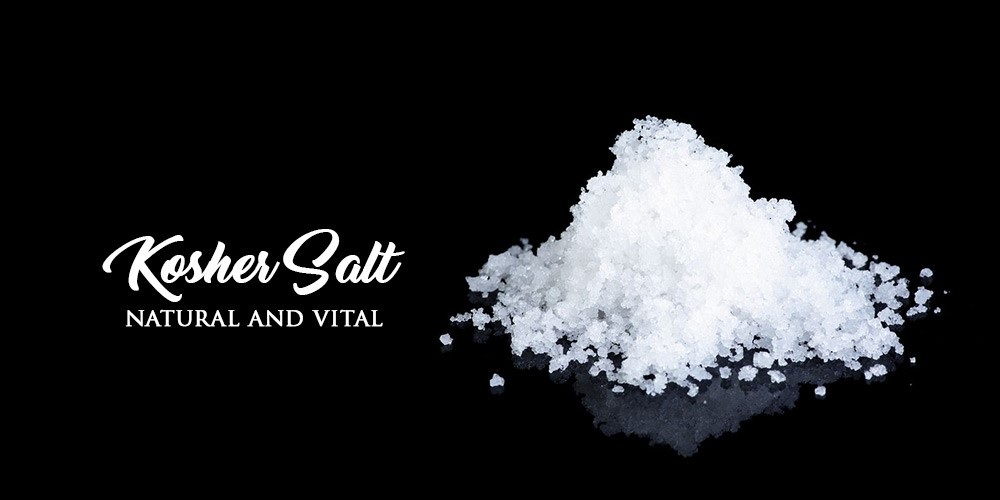Undoubtedly, salt is an essential food ingredient that adds flavor to our dishes and provides nutrients to the body, making it function properly. It has several verities and forms based on texture, crystal shapes, and sizes, like pink Himalayan salt, kosher salt, common table salt, Celtic salt, and many others. Kosher salt (also known as koshering salt) is the form of salt that has a larger crystal size as compared to the other varieties.
In this article, we would like to discuss the properties, uses, and differences of kosher salt from regular salt.
What is kosher salt?
The word “kosher” comes from a Hebrew root named “Kashér”. KASHER means pure, clear, or suitable to use.
Kosher food is the food prepared according to the Jewish dietary rules (kashrut) and strictly complies with the Jewish food standards. Kosher salt is not kosher food itself. It gets the name” Kosher” because of its use in the koshering process of food, specifically meat. The salt draws blood and moisture from the meat, making it appropriate for consumption.
The Jews had been using kosher salt to preserve the meat by removing blood and moisture from it. The reason behind the use of this salt in koshering the food was its large and coarse grains that were easy to rub and wash from the surface of food, without imparting much saltiness in it.
The crystals of kosher salt are large with a rough texture. They are flat or hollow pyramidal in shape depending on the harvesting technique. The salt is great to cook, bake, and season the food. The rough crystals of the salt are easy to pinch but take time to dissolve when compared to the common table salt.
Kosher salt comes from the underground salt deposits as well as from the evaporation of seawater.
Types of Kosher salt
There are two types of kosher salt.
- Kosher Style Salt
Kosher salt that contains coarse grains and mined just like all other types of salt is called Kosher Style Salt.
- Kosher Certified Salt
The kosher salt that meets traditional Jewish guidelines and is certified by a Jewish institute such as the Orthodox Union is called Kosher Certified Salt. This type of kosher salt is extracted just like all other kinds of salt, but the difference is that the Jewish guidelines are followed during the processing and packaging of the salt.
Some features of kosher salt
Let’s check out some characteristics of kosher salt quickly
- Flakes of the salt are large
- Texture of the flakes is coarse and rough
- The salt does not dissolve quickly and easily.
- It does not contain additives like anti-caking agents and iodine.
- Kosher salt has no iodine,provides a light salty taste to the recipes instead of making them taste bitter.
Why use kosher salt?
- Kosher salt is useful for cooking, seasoning, and preserving the food. It adds flavor to the salads, BBQ recipes, chips, and other dishes.
- The texture of the salt makes it pinch-able, easy to control, and evenly distributing while cooking.
- The purity and the light flavor of the salt is the reason that it is nutritious and healthy.
- As it comes with no anti-caking agents, the kosher salt is safe to use and is perfect to add to the pickles and sauces.
- Another benefit of the kosher salt is that it preserves meat by extracting the moisture and blood from it.
Difference between kosher salt and regular salt
The chemical composition of the two salts is the same. There are many differences between kosher salt and regular salt that we need to know.
- The foremost difference between kosher salt and regular salt is the structure and size of the flakes. The granules of kosher salt are large and coarse. Chefs find it easy to pinch and sprinkle over the food. On the other hand, the regular salt is refined in texture, and its flakes are smaller.
- Kosher receives its name due to its application in the koshering process of meat and extracting moisture from vegetables. While the table salt, as its name suggests, is ideal to be on the table for seasoning food.
- Kosher salt has no added iodine in it. On the other hand, the regular salt contains iodine as an additive. The iodized salt provides a more concentrated dose of iodine that improves the performance of the thyroid gland in the body. It also results in the production of hormones that aid in tissue repair and enhance the growth and development of the body.
- Kosher salt does not contain anti-caking and bleaching agents like calcium silicate, which are added to the regular salt to prevent its lumping.
- Kosher salt weighs less when compared to regular salt. A teaspoon of regular salt weighs double than that of a teaspoon of kosher salt. The reason is that the flakes of the kosher salt are large, while the regular salt is in the form of small, fine granules. So we can say that the two salts cannot be used interchangeably when cooking.
- Kosher salt is often used to preserve meat and also in recipes, like soups and sauces. However, the use of regular table salt is frequent than kosher salt.
Summing Up
In short, the major difference between kosher salt and regular salts lies in the size of grains. The table salt is finely ground and dissolves easily, but it is less pure and comes with fewer flavors. When we see kosher salt, it has larger, boorish flakes and does not dissolve easily.






